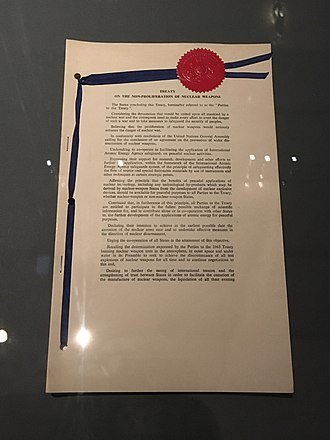The Nuclear Non-Proliferation Treaty (NPT) is a landmark international agreement that came into force on March 1st, 1970. Its primary objective is to prevent the spread of nuclear weapons, promote the peaceful use of nuclear energy, and ultimately achieve global disarmament. The NPT has played a crucial role in maintaining security and stability in the world, although its effectiveness and fairness have been subject to debate.
The NPT was born out of growing concerns about the dangers posed by the proliferation of nuclear weapons during the Cold War era. The treaty was negotiated by the United Nations and opened for signatures in 1968. It has since been ratified by 191 countries, making it one of the most widely accepted arms control agreements in history.
One of the key provisions of the NPT is its division of signatory states into two categories: nuclear-weapon states (NWS) and non-nuclear-weapon states (NNWS). The five nuclear-weapon states recognized under the treaty are the United States, Russia, the United Kingdom, France, and China. These states are committed to pursuing disarmament in good faith while maintaining their nuclear arsenals.
Non-nuclear-weapon states, on the other hand, commit to not acquiring or developing nuclear weapons. In exchange, they are granted access to peaceful nuclear technology and assistance for the development of nuclear energy for peaceful purposes. This arrangement is known as the “grand bargain” of the NPT, where non-nuclear-weapon states agree to forgo nuclear weapons in exchange for the benefits of peaceful nuclear cooperation.
The NPT also established the International Atomic Energy Agency (IAEA) as the primary international organization responsible for verifying compliance with the treaty’s provisions. The IAEA conducts inspections and safeguards to ensure that nuclear materials are used solely for peaceful purposes and not diverted for military use. This system of safeguards has been crucial in preventing the proliferation of nuclear weapons.
Over the years, the NPT has faced challenges and criticisms. Some argue that the treaty has not done enough to achieve disarmament, as the nuclear-weapon states have not made significant progress in reducing their arsenals. There are concerns about the modernization and expansion of existing nuclear weapons programs, which some argue is in violation of the treaty’s spirit.
Additionally, there have been calls for the inclusion of new nuclear-weapon states in the treaty. Countries like India, Pakistan, and North Korea, which have developed nuclear weapons outside the framework of the NPT, pose a significant challenge to the treaty’s universality. Efforts to bring these states into the treaty have been met with limited success.
Despite these challenges, the NPT has undeniably played a crucial role in preventing the further spread of nuclear weapons. It has created a framework for dialogue and cooperation among nations, promoting transparency and trust-building. The treaty has also facilitated the exchange of information and technology for peaceful nuclear applications, such as medicine, agriculture, and energy production.
The NPT has been successful in curbing the proliferation of nuclear weapons, as evidenced by the fact that only a handful of countries have acquired nuclear weapons since its inception. The treaty has also contributed to the reduction of nuclear stockpiles, albeit at a slower pace than desired.
In conclusion, the Nuclear Non-Proliferation Treaty, which entered into force on March 1st, 1970, has been a cornerstone of global efforts to prevent the spread of nuclear weapons, promote peaceful nuclear energy, and work towards disarmament. While facing challenges and criticisms, the NPT has undeniably played a significant role in maintaining security and stability. As we move forward, it is crucial for all nations to reaffirm their commitment to the treaty’s objectives and work towards a world free of nuclear weapons.
SEO Excerpt:
The Nuclear Non-Proliferation Treaty (NPT) entered into force on March 1st, 1970. Discover the historical significance of this landmark agreement, its objectives, and the challenges it has faced. Learn how the NPT has contributed to global security and stability, and explore the ongoing debates surrounding its effectiveness and fairness.

